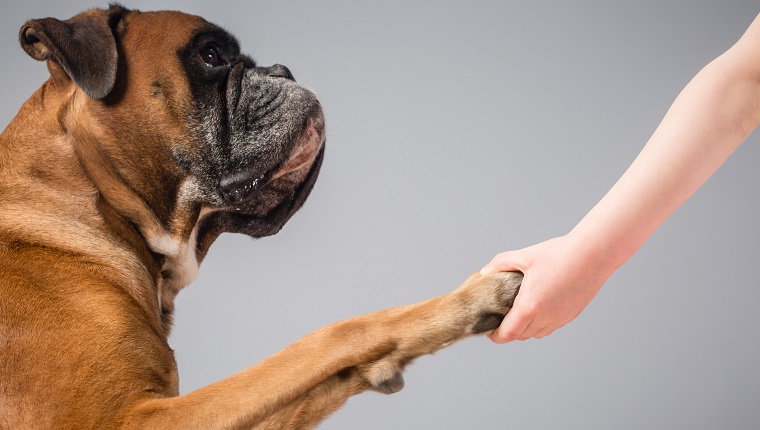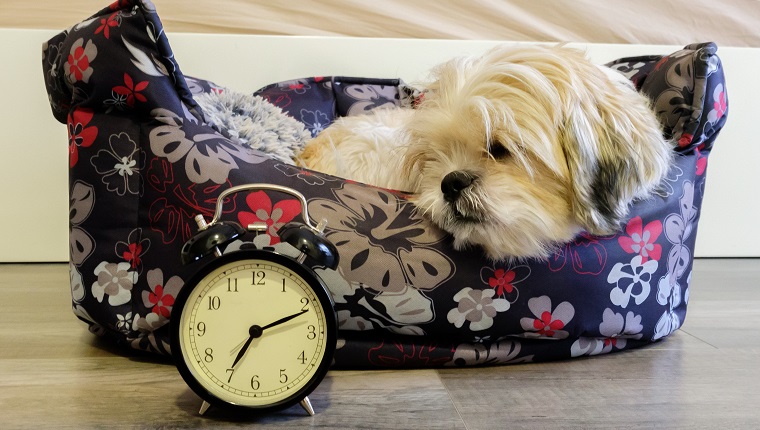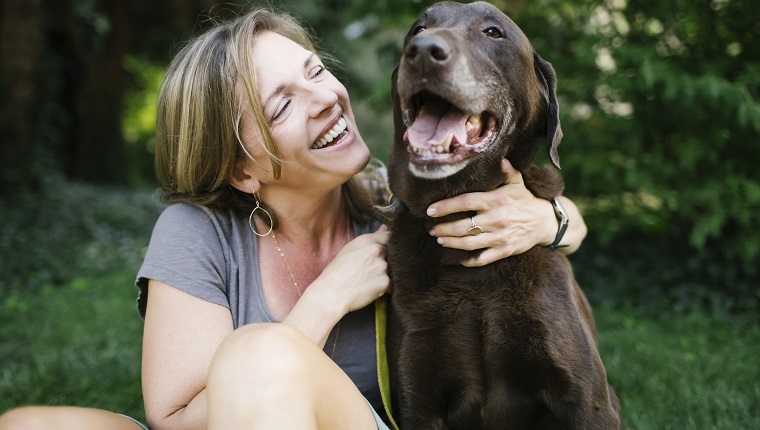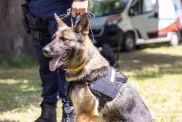Gold Souls, Gray Faces is a series that focuses on loving and taking care of our sweet senior dogs. When it comes to getting a pet sitter for an older pup, there are plenty of things to worry about.
Seniors often have medical needs that have to be addressed, and when our dogs get gray in the muzzle, they can start to get set in their ways. Maintaining a schedule can be very important for senior dogs, especially if they suffer from issues like anxiety or canine cognitive dysfunction — the dog version of Alzheimer’s.
Your pet sitter needs to handle all of your senior dog’s individual, special needs while you’re away, and it’s your responsibility to help prepare them to provide the right care for your pooch. You must also work with your dog to make sure they are as comfortable as possible during your absence.
If that all sounds like a lot to be concerned about, it is — but don’t worry. These seven tips, along with your own good judgment, can help you get your pet sitter and your dog ready to spend time together while you’re away.
1. Find A Trusted Pet Sitter
Finding a pet sitter you can trust to trust with your pup can be hard when you have a dog of any age, but it becomes especially challenging when you have a senior with special needs.
This is one reason that it’s important to start looking for a pet sitter well before you have to leave, as it may take extra time to find the right person to provide care for your older dog.
Ideally, you’ll be able to find a friend, family member, or neighbor with whom your dog is already familiar, but the people you know might not always be available. You may have to rely on a pet sitting service, but don’t panic. There are several ways to determine if a pet sitter is right for you and your dog.
Here are a few things to look for:
- Recommendations from people you know and trust go a long way. If they have had success with a pet sitter, hear them out.
- Positive online reviews are important, too. Always look up a pet sitter or pet sitting service online before you let them care for your dog. If you see something you don’t like, move on to the next pet sitter.
- A good pet sitter should always agree to meet with you and your dog beforehand. They should not charge extra for this meetup. It’s a part of the job, and it’s essential for any pet sitter to provide the right kind of care.
- They should have prior experience with senior pets and the special care they might need.
- They should be willing to stay at your home where your dog can be comfortable in familiar surroundings. Ask them if they have other responsibilities or if they need to be away from the home for any significant amount of time during their stay. If they plan to leave your dog alone for more than a few hours at most, get a different pet sitter with fewer obligations.
- Every pet sitter should have a background check that is either provided by their company or by the individual, themselves. If they don’t have a background check, don’t hire them.
These are just some of the basics that you should be aware of when choosing a pet sitter for your senior dog, but there are plenty of other questions you can ask and things to look out for. Here are a few other resources you may find helpful when looking for a pet sitter:
2. Make Introductions

Every good pet sitter, whether you know them personally or not, should agree to meet with you and your dog before you leave so you can make introductions.
This is a crucial step in making sure that your dog is comfortable while you’re away. You probably wouldn’t like it if a complete stranger showed up to stay in your home, and your senior dog wouldn’t like it either.
Introducing your senior dog to a pet sitter should always be done while you are present, calm, and comfortable. Even old dogs react to their humans’ emotions, and if they see that you are relaxed, it will help put them at ease.
This will also be a chance for you to meet and observe your potential pet sitter, and you can see how they will interact with your pooch. Any dog can be reactive to the presence of a stranger in their territory, and seniors can be especially upset with the disruption to their routines.
Work with your pet sitter. Provide them with treats, toys, or anything that will help them get on your dog’s good side. They should be willing to stay for as long as it takes to get your dog comfortable.
3. Leave Detailed Instructions For Special Needs And Medication
The introduction is a good time for you to go over your senior dog’s special needs and medication requirements in person. This, however, should not take the place of detailed notes with instructions for your dog’s care.
Make sure to leave your vet’s information, as well as the info for the nearest emergency veterinarian.
Here are a few of the instructions you should leave for your pet sitter.
- List your dog’s medication dosage and schedule.
- Go over teeth brushing, ear checks, and any other hygiene requirements.
- If your dog has special dietary restrictions and requirements, make sure your pet sitter is well aware of them.
- Explain your dog’s physical assistance needs. Do they need to be picked up or carried sometimes? Is there a special way they need to be held? What do they need to get around?
- If your dog has anxiety, go over your usual methods for keeping them calm. Let your pet sitter know if the windows need to be curtained so your dog can’t see other pups on the street. Tell them if your dog needs a television or radio turned on. Do they prefer to be touched or left alone when they are nervous? Help your pet sitter reduce anxiety as much as possible.
- Go over your dog’s usual behavior so your pet sitter can tell when something is out of the ordinary. If your senior suffers from dementia, explain the usual symptoms so the pet sitter knows what to expect. If your pup has trouble with occasional vomiting, bladder control, or arthritis, tell your pet sitter what to watch for. Your pet sitter needs to know the difference between your senior’s normal behaviors and medical situations that need to be addressed by a vet.
These may not be the only instructions you should go over. They’re just a good start. Your dog may have individual medical and special needs that must be addressed. Be thorough.
As a former pet sitter, I can tell you that it’s better to have too many notes than not enough.
4. Go Over Your Dog’s Schedule

What does a typical day look like for your dog?
Senior dogs are often comforted by a steady, predictable routine, and it can be downright necessary for dogs who suffer from dementia or anxiety. Not having you around is already stressful enough for your pup, and there’s no reason to make it worse by changing up their whole schedule.
Here are a few things you should include when going over your dog’s routine with your pet sitter:
- Note what time your dog likes to wake up and go to bed. If they have a usual nap schedule, include that, too.
- If your dog needs to go outside or go for a walk at a certain time, let your pet sitter know.
- What time does your dog eat? Sticking to a normal food schedule isn’t just important for keeping your senior dog calm; it can also help keep their body functioning normally.
- Does your dog like to play at a certain time? Do they prefer to be somewhere specific in the home at certain hours? Do they need the television on during the day? Go over your dog’s quirks. Anything you can do to keep them going on with business as usual will be helpful.
5. Make Cleaning Supplies Easily Accessible
Senior dogs can be messy, especially if they are incontinent, get upset stomachs easily, or just get confused about where and when to go potty.
Show your pet sitter where the cleaning supplies are, and make sure you have more than enough to tackle messes while you’re away. You should have a vacuum, paper towels, and cleaners for hard surfaces, rugs and carpets, and furniture.
You should also have laundry detergent in case your dog has an accident on sheets, blankets, or dog beds.
Of course, your dog may need a bath after making a mess, so provide doggy shampoo and fresh towels, too, as well as instructions for bathing your senior.
6. Leave Comfort Items

There’s nothing wrong with leaving a well-worn sweater in your dog’s bed or crate while you’re away, and for a senior dog who is anxious and misses your scent, it can be a big source of comfort. Having your scent nearby can help your dog feel like things are less out of the ordinary.
Comfort items may not be just about your scent, though. Sometimes dogs have favorite toys, blankets, or stuffed animals that they love. Make sure your pet sitter is aware of these items so they don’t accidentally move them, and make sure they know to retrieve these items if they fall behind some furniture or roll under the bed.
If your senior dog is crate trained, their crate and dog bed may be comfort items that provide them with a place to feel safe. Your pet sitter should know about these items, too, so that they can make sure your dog has access to them at all times.
7. Set Expectations For Check-ins
Let your pet sitter know how often you want to be updated.
Obviously you’ll want to know if there’s an emergency, but you should also explain how often you just want to hear about your pup. Tell your pet sitter if you want a text, email, phone call, or a video chat to see your dog.
A great pet sitter won’t make you feel embarrassed about wanting to talk to your dog via Zoom or Skype. They’ll understand, and chances are good that they’d want the same if they left their dog with a pet sitter.
If you’ll be available during a certain time of day, let your pet sitter know when you expect to be contacted. If you’d rather not be bothered too much, let them know that, too. Be as specific about your update expectations as possible.
What other tips do you have for getting a pet sitter ready for a senior dog? Have you ever relied on a pet sitter to care for your older pooch? Let us know in the comments below!









